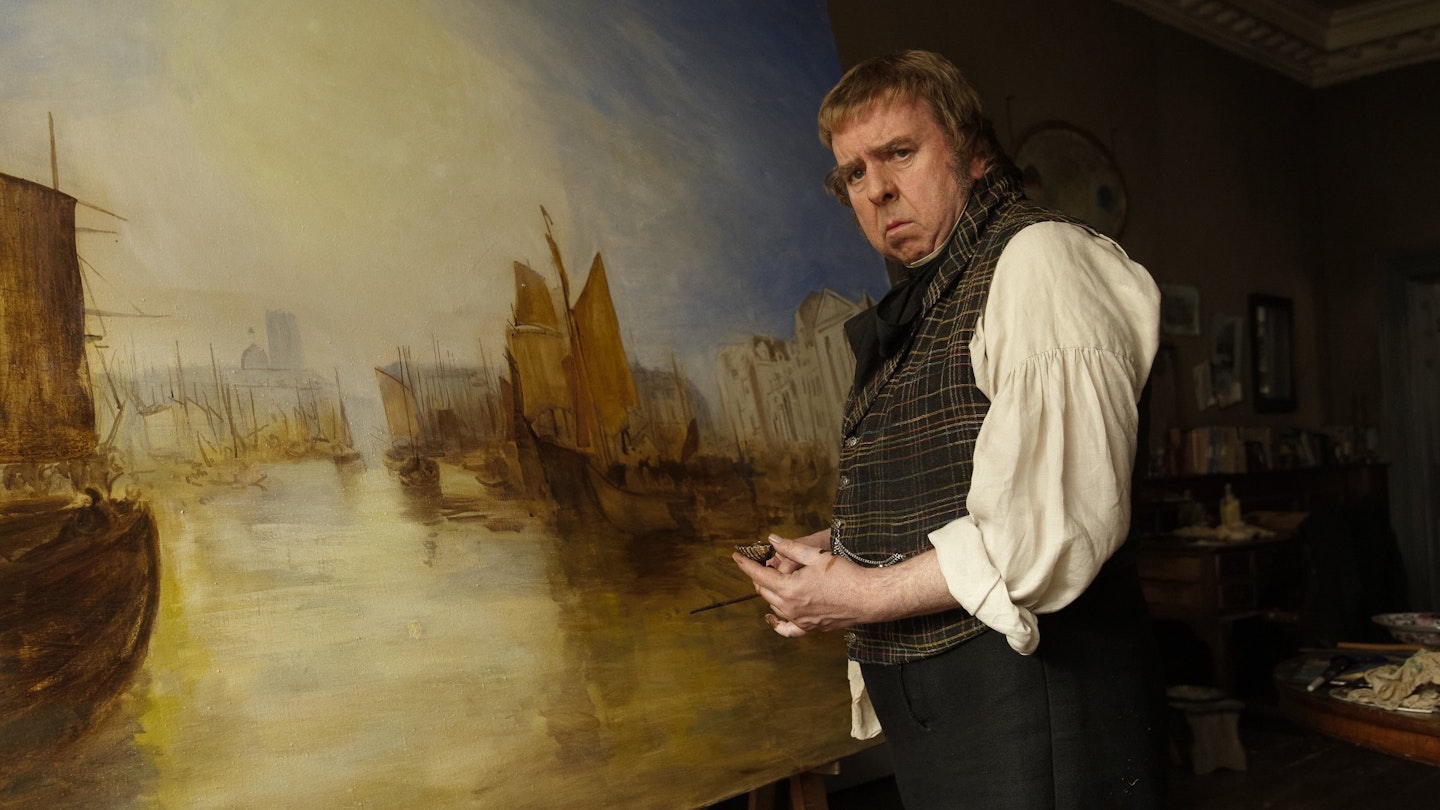Gruff, unkempt, steely of eye, wasp-swallowing of frown; a creature without vanity but not lacking in confidence; an artist of great renown but reticent about his methods; a traditionalist who pushes boundaries; a man of the people who mixes in exclusive circles; an uncompromising, unfettered, unpredictable customer all round. But enough about Mike Leigh — what of Joseph Mallord William Turner?
There is no shaking the scent of autobiography in Leigh’s superlative period piece, a study of the closing 25 years of the famed 19th-century painter’s life at once epic in scope and intimate in detail, a film wonderfully, bewilderingly, and heart-stirringly alive. Note how Leigh chooses to portray his subject in his dotage. And how they both embody a notion of Englishness.
Masterpiece feels too obvious a word to bandy about a film so concerned with their creation, but at 71, Leigh has never been more invigorated, or more wholly cinematic. With its nimble camerawork and luminous landscapes that tease at Turner’s celebrated ache of colour and cloud, it puts paid to the chestnut of Leigh as council estate miniaturist.
The film is told in slivers or brush strokes of life both fine and coarse. Indeed, the scenes of Turner at work, attacking notebook or canvas, even loosing a gob of spit into his oils, suggest a man possessed. He is a tempest who paints tempests. But there is precious little plot in the regular sense. A life flows, and by extension towering art flows from that life. To separate the two would be impossible. The need to paint is a fever for Turner as great as his sexual urges or his swells of compassion.
All of this comes care of the extraordinary Timothy Spall, who took a year to find his feet with pencil and paintbrush. He fashions an inwardly bent genius, this gloriously strange curmudgeon, part Michelangelo, part Toad of Toad Hall, grunting and spluttering his way through polite society. While beneath the rude, comical veneer flow tides of sadness and yearning entirely impossible to fathom. Anyone else in the role is unthinkable. To separate actor and subject is impossible.
We glimpse Turner on his travels. We regard him at his sizeable London pad. In his studio, engulfed by his muse, Jekyll transformed into Hyde (or is it the other way around?).
Contradictions are rife. He shares congenial shorthand with his old pop (Paul Jesson), but has become pathologically estranged from an indignant and wounded mistress (Ruth Sheen, giving a thunderous performance entirely with her nostrils) and his timid daughters. Arriving at the Royal Academy, crammed with artists and their latest accomplishments, he appears both outsider and figurehead. In a lovely, waltzing camera move, Leigh dances about the unstoppable Turner as he tosses out guttural greetings to his peers — all you need to know about British art’s most celebrated rivalry summarised in a blunt exchange: “Constable.” “Turner.”
He’s an oddball right enough, but Leigh strikes out for his humanity. Wait until you hear Spall blub — it’s as if someone has kicked Chewbacca in his hairy undercarriage. Yet we are pinned by the pitiful sound as Turner attempts to sketch a young prostitute, undone by her simple youth in the wake of his father’s passing.
There is so much that Spall and Leigh make us privy to: the transcendent, the ordinary and the, frankly, flatulent. How Turner kept a more than passing acquaintance with his steadfast housekeeper (Dorothy Atkinson, pouring intricate agonies into unschooled devotion) and later finds love in the arms of a widowed Margate landlady (Marion Bailey), a tender autumnal romance kept hidden from his peers. Beneath the grainy Dickensian mood, we still frequent that most Leigh of venues — the British living room, cringing with social niceties. After a stultifying discussion of gooseberries at the Ruskins’, John Ruskin (Joshua McGuire, a model of concentrated smarm) confronts him with the horror of art criticism.
As his health fails, and we close in on the dying of the light, there comes the question of legacy. We find Turner at a photographer’s studio; Spall defying the lens with a volcanic pout. “Finished!” declares the photographer after ten seconds of exposure. “Yes,” growls Turner, “my thoughts exactly.” And we join him captivated by an old ship being towed across the Thames (CGI in a Mike Leigh!), inspiration for his most famous painting, The Fighting Temeraire, a battleship heading for the scrapyard. Of course, we come equipped with the knowledge that Turner’s paintings would never be forgotten. In Leigh’s hands, the man is as unforgettable as the art.






